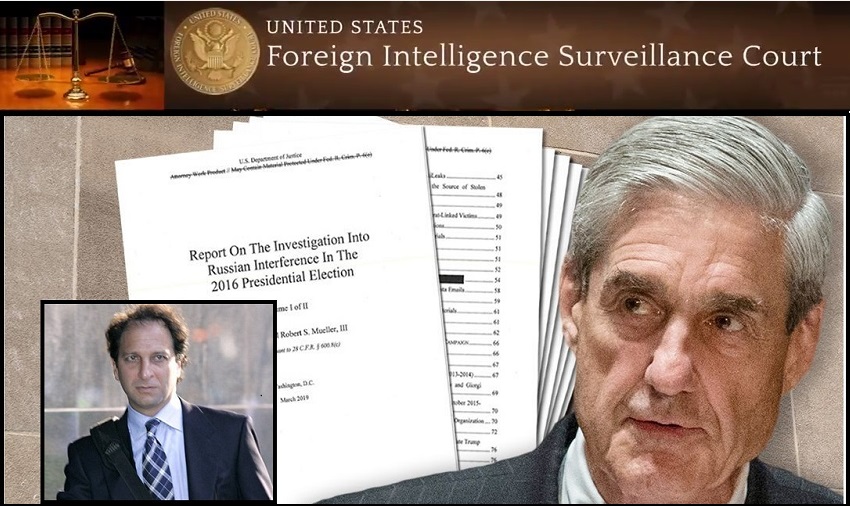Comparing a New York Times Headline to an Honest Headline
New York Times Reports Andrew Weissmann & Robert Mueller
Sought, Then Hid, Special Counsel Surveillance
of Trump White House Attorney Don McGhan
My headline is what happened, the New York Times headline is massive spin: “Apple Is Said to Have Turned Over Data on Trump’s White House Counsel in 2018”.
Notice what the New York Times is doing here. Everything about their article is written to hide, obfuscate and ignore the reality of what their article actually is revealing. Look closely:

“tactics by the Trump Justice Department“? This is far beyond spin, it is an intentional effort at cognitive dissonance. Perhaps this article is written now because the Durham investigation is going to reveal how Mueller and Weissmann conducted investigative surveillance over the Trump White House… Likely, but rather than supposition let’s just go to the reality of the details.
The headline positions Apple as the center, but the real nub of the revelation is that Weissmann and Mueller used the Special Counsel and FBI to conduct surveillance on the White House legal counsel, and his family, while President Donald Trump was in office. Think about that for a moment. Think about it carefully.
Imagine if Donald Trump allies in the DOJ and FBI were conducting surveillance on Joe Biden’s White House legal counsel? The media would go absolutely bonkers… rightfully so; yet, that is exactly what happened when Trump was in office. The intelligence apparatus was weaponized to conduct political surveillance of President Trump, through the White House legal counsel, while he was in office.
THIS IS A MASSIVE issue. Yet the media are downplaying what took place because, well, the stunning abuse of DOJ power is in alignment with their political objectives.
From the article (emphasis mine):
WASHINGTON — Apple told Donald F. McGahn II, the White House counsel to former President Donald J. Trump, last month that the Justice Department had subpoenaed information about an account that belonged to him in February 2018, and that the government barred the company from telling him at the time, according to two people briefed on the matter.
Mr. McGahn’s wife received a similar notice from Apple, said one of the people, who spoke on the condition of anonymity to discuss a sensitive matter.
It is not clear what F.B.I. agents were scrutinizing, nor whether Mr. McGahn was their specific focus. In investigations, agents sometimes compile a large list of phone numbers and email addresses that were in contact with a subject, and seek to identify all those people by using subpoenas to communications companies for any account information like names, computer addresses and credit card numbers associated with them.
Still, the disclosure that agents secretly collected data of a sitting White House counsel is striking as it comes amid a political backlash to revelations about Trump-era seizures of data of reporters and Democrats in Congress for leak investigations. The president’s top lawyer is also a chief point of contact between the White House and the Justice Department.
Notice what the NYT is doing here? They are attempting to blame Trump for a subpoena against his own White House counsel. Crazy level of spin to cloud the real story of what was going on.
Apple told Mr. McGahn that it complied with the subpoena in a timely fashion but declined to tell him what it provided the government, according to a person briefed on the matter. Under Justice Department policy, gag orders for subpoenas may be renewed for up to a year at a time, suggesting that prosecutors went to court several times to prevent Apple from notifying the McGahns earlier.
[…] Apple told the McGahns that it received the subpoena on Feb. 23, 2018, according to a person briefed on the matter. The other person familiar with the matter said the subpoena had been issued by a grand jury in the Eastern District of Virginia.
It is not clear why prosecutors obtained the subpoena. But several notable events were occurring around that time. (read more)
 February 2018 was at the time when the Weissmann/Mueller special counsel was at it’s apex. In early February the corrupt special counsel found out about the FBI leak investigation into the Senate Select Committee on Intelligence (SSCI) that surrounded James Wolfe and Senator Mark Warner.
February 2018 was at the time when the Weissmann/Mueller special counsel was at it’s apex. In early February the corrupt special counsel found out about the FBI leak investigation into the Senate Select Committee on Intelligence (SSCI) that surrounded James Wolfe and Senator Mark Warner.
The leak investigation was run out of the Washington Field Office by Brian Dugan. The special counsel was unaware until the case against Wolfe was complete.
What the special counsel was doing in February 2018 was: (1) covering the tracks of the Obama-era political surveillance; (2) trying to retain their own investigative credibility by hiding prior abuses by the DOJ and FBI during that surveillance; (3) continue surveillance of the Trump administration under the auspices of a “Trump-Russia Collusion/Conspiracy” investigation; and (3) build a fraudulent obstruction case against President Trump in order to remove him from office.
As Deputy AG Rod Rosenstein noted in his April 2020 testimony to congress, Rosenstein was facilitating all the requests made by the special counsel. Rosenstein did not question any of the expanded scope requests from Weissmann/Mueller, and Rosenstein did not deny an requests for investigative tools or techniques that required his signature. In short, Rosenstein gave the special counsel every authority they requested without any pushback. When Rosenstein was questioned about this he said he didn’t feel it was appropriate to challenge the special counsel as it could be perceived as him interfering with their “investigative techniques” and “authorities.”
So what this New York Times article is really highlighting is how the Weissmann/Mueller special counsel went after the personal records of White House Attorney Don McGhan and his family. DOJ Attorney Andrew Weissmann was digging for information that could be used against the Trump White House. THAT is where the subpoenas came from.
It is possible the New York Times is trying to get out in front of the issue with this article. Keep in mind the primary PR firm of the FBI is the New York Times. When the FBI needs cover, they shape their side of events to the New York Times via “people familiar with the matter” etc.
Perhaps Durham is close to reporting on the motives and operations of the Special Counsel, who knows? But there’s a reason why the New York Times is trying to cloud the background of what this surveillance of the Trump White House counsel is all about.






Post a Comment